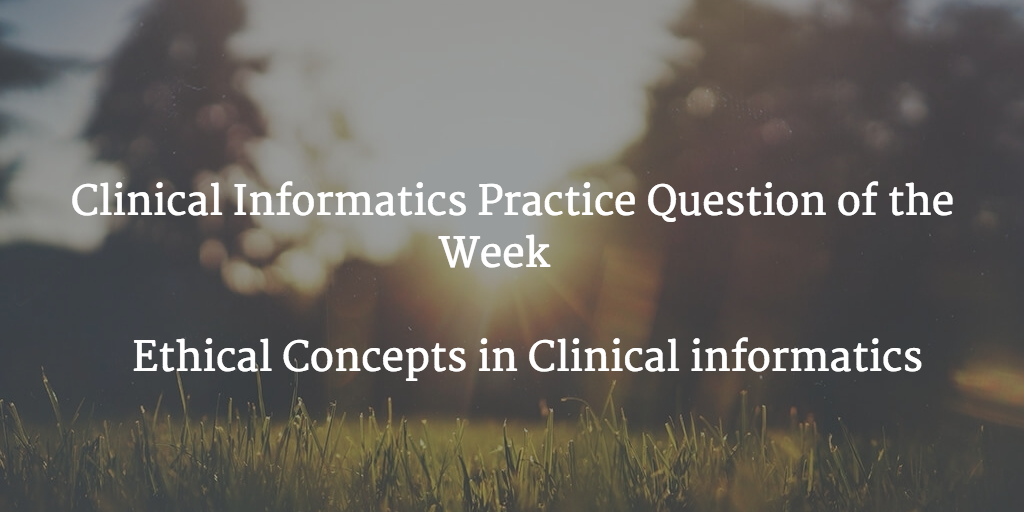Welcome to this week’s clinical informatics practice question of the week. Many of you have already taken this year’s test (we’re sure you did amazing) and some of you are taking it in the next few days (don’t worry you’ll do great). We wish everyone the best of luck on the exam!
This week, we’ll be looking into ethical concepts in clinical informatics Just like any other specialty, clinical informatics has its own definition of ethical concepts. Ethics in informatics includes a set of ethical concepts followed by clinical informaticists and healthcare providers when performing their duties.
First and foremost, every healthcare provider must have the following generally accepted ethical qualities:
- compassion
- kindness
- responsiveness
- thoughtfulness
- care for the patient
The Hippocratic Oath states “Whatsoever house I may enter, my visit shall be for the convenience and advantage of the patient.”
Based on the above-mentioned ethical qualities and the words from the Hippocratic Oath, we see a pattern, which leads us to the conclusion that ethical concepts in clinical informatics revolve around the patient and taking a good care of him/her.
Below are some of the primary ethical concepts as well as some examples of each:
- Autonomy
The autonomy concept means that a patient’s wish is the law for a healthcare provider.
Example: Informed consent. In practice, this concept means not only the inadmissibility of obstructing the patient’s autonomous activity, but also the assistance in realizing his/her autonomy, (for example) by providing the patient with the veracious information.
- Beneficence / Nonmaleficence
The beneficence concept obliges a healthcare provider to do only good deeds aimed at the betterment of the patient, while the nonmaleficence concept means minimizing, and if possible, eliminating a possible negative impact of the treatment on the patient’s physical and psychological well-being.
Example: The Hippocratic Oath – Maximize good, minimize harm.
- Best Interest Standard
The best interest standard concept obliges a healthcare provider to make a decision in the best interests of the patient when he/she is not able to do it on his/her own.
Example: It often happens that a patient cannot make a decision that is crucial for his/her further treatment, on his/her own. In that case, such a decision can be made by the patient’s relatives, but if there is no opportunity for the relatives to make the decision for the patient, and the decision must be made urgently, then the healthcare provider of the patient takes it upon him- or herself to make a decision in the best interests of the patient.
- Fidelity
Fidelity to the patient is achieved through the loyal relationship between a healthcare provider and a patient. This ethical concept is the foundation of trust between a healthcare provider and a patient.
Example: Patient trust of healthcare providers.
- Justice
The justice concept means a fair treatment to patients as well as people in general. Humane attitude as well as generally accepted ethical rules are key components of this concept.
Clinical Example: Healthcare reimbursement limits for providers, deciding who receives an organ transplant, etc.
- Rights
The rights concept obliges a healthcare provider to fully respect the rights of a patient – as well as any other person – under the law in force.
Example: Privacy and confidentiality laws.
- Veracity
This concept means unconditional honesty with a patient. No way should a healthcare provider deceive his/her patient, even if he/she believes it’s in the best interests of the patient. This ethical concept is closely related to the Autonomy, Fidelity and Rights concepts described above.
Example: Use of placebos in medical research, full disclosure by patients, etc.
Question
What should a healthcare provider do in case he/she has to make an urgent decision about the patient’s treatment, while the patient is in coma and there are no relatives around and there are no advance directives?
- Wait until the patient wakes up;
- Make a decision in the best interests of the patient on his/her own;
- Do nothing;
- Sign a waiver of responsibility.
Answer and explanation
The correct answer is b) Make a decision in the best interests of the patient on his/her own.
Ethical concepts oblige the healthcare provider to make a decision in the best interests of the patient on his/her own if the patient is not able to make the decision him- or herself and there are no relatives around.
For more information on mental capacity, legal competence, treatment consent, and ethical decision-making, be sure to check out the resources below for some “light” reading.
Resources and Additional Reading
Mental capacity, legal competence and consent to treatment. http://www.ncbi.nlm.nih.gov/pmc/articles/PMC1079581/
Medical decision making for the incompetent patient. http://www.ncbi.nlm.nih.gov/pubmed/10285412
Also, be sure to check out our exam questions and full-length exam for more practice before taking the clinical informatics exam.
